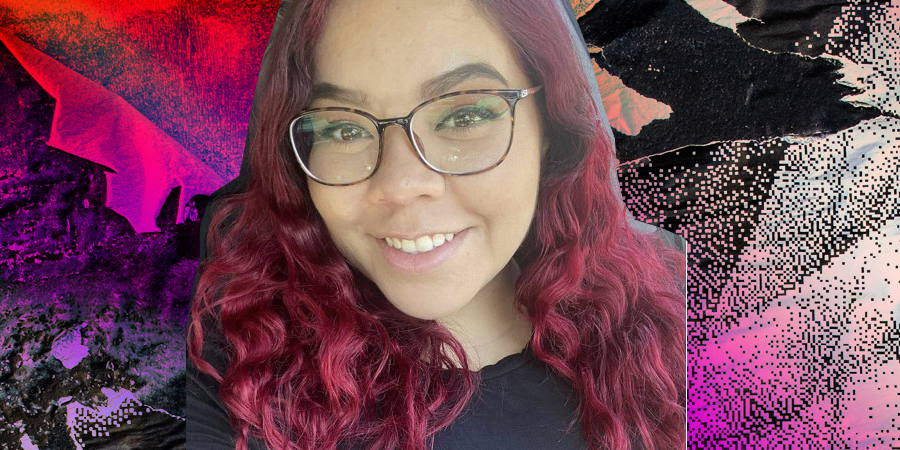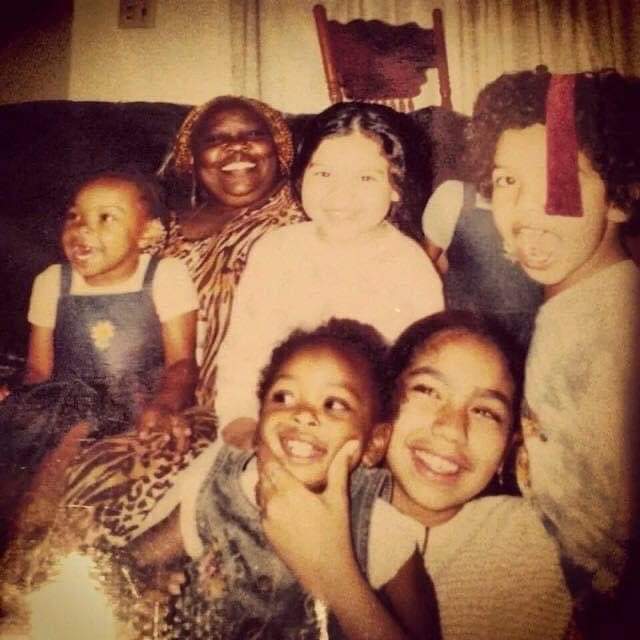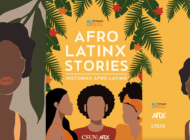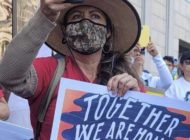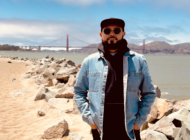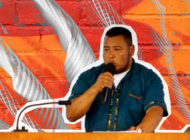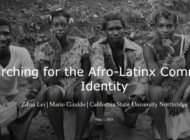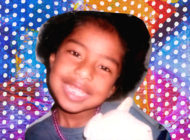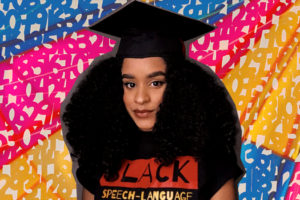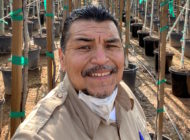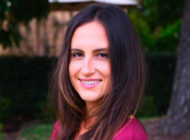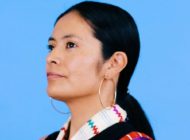In this episode, Yesenia Delgado talks to Shania Toriquez, who was born very light skin, and for her, it was an everyday struggle to know who she really was because people would deny her African roots.
By YESENIA DELGADO
EL NUEVO SOL
Yesenia Delgado: Welcome to Radio Nepantla, a podcast by El Nuevo Sol, the multimedia site for the Spanish-language journalism program at California State University at Northridge. My name is Yesenia Delgado.
The title of this series is Afro-Latinx. We want to tell here diverse stories of Afro-Latinx, Black-Latinx, and Afro-Latin American identity.
According to the Pew Hispanic Center, one out of every four Latinos in the nation identify as Afro-Latinx. This is the same proportion of Afro-Latin Americans in that region.
We decided to use the term Afro-Latinx—with X—to be inclusive of non-binary people. The umbrella term “Black-Latinx” refers to biracial people with one African American and one Latinx parent. The umbrella term “Afro-Latin American” refers to people of African ancestry in Latin America.
In this episode, I interviewed Shania Toriquez.
Edlin Veras: The type of representation also matters. And then, someone again… when we’re showing these disjunctions between… this alleged disjunction between Latinx and Black, when… you show someone like Amara La Negra, who is, again, brown-skinned and (has) Afro textured hair—where we as a society are forced to confront this idea that these people exist. And they can look like this, right?
Yesenia Delgado: This is the voice of Edlin Veras, a doctoral student at the University of Miami who has studied Afro-Latinx identity and who was interviewed by El Nuevo Sol in February. Here, he is discussing how the media usually presents light-skinned Afro-Latinx artists and singers instead of dark-skinned ones like Amara La Negra. Dark but not too dark-skinned seems to be the way that media represents Afro-Latinidad. Some scholars even argue that to be Afro-Latinx, the person needs to be perceived as Black by society and live the experience of most African-Americans. So, when someone is mixed-race but is born without a darker skin-tone, people question their identity. Shania was born very light-skinned, and for her, it was an everyday struggle to know who she really was because people would deny her African roots.
Shania Toriquez: So, going back to my skin color, I am very light-skinned. So, when they tell me, ask me what I am, I just say European or Mexican because I do get questioned whether I am Black because I don’t look like my siblings, which have a darker complexion than me.
Yesenia Delgado: Her parents had her twenty-four years ago in 1996, she is the youngest of four. Her mother is first generation Mexican-American; her grandfather came to this country with an agriculture visa and worked planting trees. Shania’s father is African-American and White. All her life she has grown up with her mom’s family in the area of East Los Angeles, which is mostly of Mexican descent.
Shania Toriquez: My father—they’re from here, they’re from L.A. I don’t really know much about my African side and his mom was Black and his dad was White, actually. So, you know, I just knew they were just from here. I don’t really know much about where my family is from, but I did do the ancestry (test) and I know my ancestors came from Nigeria. So, that’s all I really know.
Yesenia Delgado: Growing up Shania always felt different because she knew she did not reflect what an African-American or Mexican-American looked like. Because of her light skin she felt more connected to be White than Mexican or Black. The reason for this was because many times she saw how her siblings were discriminated because of their skin color. She was not a “target” of those mean comments.
Shania Toriquez: Possibly when I was six years old, I was with my brothers who have a darker complexion than me, they look Black and I was with them. And they basically—the adults were questioning us because I look like them, yes, but at the same time I don’t because, you know, of my skin color. When I saw or hear their stories about how they were profiled as a Black child and very judged about how they look, you know, it shows how the world was. And at the point, I was happy I was light-skinned, that way, I wouldn’t have to identify as that.
Yesenia Delgado: Because she is seen as a White person due to her skin color, she does not face the discrimination that an African-American usually faces in the United States because of their skin color. But when people find out she is in fact African-American they always question her skin color. Even though she is very grateful that she does not have to face those moments in her life time, she is still a target of discrimination by being Latinx. Some of the Latinx community strongly believe that someone who doesn’t speak Spanish is not Latinx enough because, to them, they are denying their roots by not speaking the language.
Shania Toriquez: I actually don’t speak Spanish. So, when I would say I was Mexican and they would talk to me in Spanish and I would say, “I don’t know Spanish,” they would be like “well, you said you’re Mexican but yet you’re here not speaking Spanish.” And I would have to say, “well, my grandfather came to this country to give his child, his children, and his future grandchildren a better chance. So, he decided not to teach us Spanish.” And for my Black side, while I can’t change the color of my skin but I do know what runs through my blood. And you know what—the Black culture—I can do to represent.
Yesenia Delgado: Since she was little, she never knew what she really was because of other’s people’s opinion. If she would say she was African-American people would not believe her because of her skin color. If she would say she was Mexican-American people would not believe her because she did not speak Spanish. People may think that this is not important because a Latinx could be anyone who identify as one, but some people think otherwise. In Shania’s experience older Hispanic people are usually the people who made rude comments to her about not speaking Spanish.
Shania Toriquez: Like I said, my grandfather he didn’t want anybody to know Spanish. He only taught his wife—my grandmother—how to speak Spanish but my mom and her siblings neither of them known Spanish. So, we were all an English (language speaking) household. The only problem where I have problems speaking Spanish has been in the outside world or at my job. I had these older Hispanic women come to my boss and say I should be fired because I don’t know Spanish. So that was really (a moment when I thought) like “oh, I have know Spanish.” But, you know, I try to understand them—I just can’t, you know, speak the language.
Yesenia Delgado: In view of the fact that both of her identities that are part of her does not approve of her because of her skin color and the language she does not speak. The only think that she knew was that she was White, and she only knew how to speak to English. The African-Americans and Mexican-Americans could never fully accept her because her appearance does not apply to what is “normal” to them.
Shania Toriquez: I had a hard time identifying who I was as a child. So, I basically I told myself I was White for a long time because I felt like I wasn’t accepted in either community, until I was able to voice my opinion about that.
Yesenia Delgado: If she would say she was White people would believe her because she did look White. She always feels like she did not belong anywhere else even when her parents and grandparents told her she was Afro-Latinx. But she always wanted to connect somehow to both parts of her culture because she thought she was missing out a lot and feel left out. Which is something a lot of people can connect to her because they are not one hundred percent something there would always something that does not apply to been African-American or Mexican and it does feel like something is missing.
Shania Toriquez: Oh yeah, definitely, you know, I just sometimes feel like the outsider because I can’t connect with them when they’re speaking Spanish. They have their jokes, or you know, if they say something about, you know, a tradition on an African-American family.
Yesenia Delgado: Filling out applications should be something very easy to do. Most of these applications usually ask about everyone’s ethnicity. People usually only choose one but what can people do when they are more than one ethnicity? There are some people who put their ethnicity as “other.” In other words, these people are not something that is normal to everyone else.
Shania Toriquez: Personality-wise no, but when it does come to, when I’m writing down what ethnicity I am, I do have trouble because right now most of us are of mixed generation and so some people are just like, well what are you mostly of? And that is a struggle. Well I feel like I am everything, but you tell me I can only choose one?—which is very difficult.
Yesenia Delgado: When people come out to her and question her identity, they usually offend her in someway by making mean comments to her, but Shania does not hold grudge against them because she knows that they could change their way of thinking by just explaining to them what she is and that everyone is different in a very special way.
Shania Toriquez: I just say, you know, we all just come (in) different colors and sizes and, you know, my Black side just doesn’t come out. So I just look, you know, I am Mexican, or, you know, White, basically. And I just you know just let them say what they wanna say and just move on with that.
Yesenia Delgado: Even when she had to go through those awful moments, there were other instances when she did feel a connection to her roots and learn to accept who she was. It was a long process for her to do that and be proud of where her ancestors came from. Her grandmother, who was fully African-American, was worried about her because she knew her granddaughter would face many struggles due to her light skin. Her grandma knew people would question her about who she was because she looks different from everyone else even when she did look like her family member her skin color would always be an issue to other people who did not know her and where she came from.
Shania Toriquez: So, when I was twelve, I had a group of friends and their families were Mexican and they just spoke Spanish. So, they were able to help me, you know, build. I don’t speak it, but I could understand the language. And then my grandmother of my dad side she’s very dark skinned, you know, her children are dark skinned, as well. So, she had to pull me aside—also when I was ten years old, telling me (that) I am Black. And the color of my skin shouldn’t reflect on how I feel, you know. I’m just a color and this is how god wanted me to come out. And I just have to learn to embrace it. And there’s nothing to be ashamed about being Black or being a Mexican that doesn’t even know Spanish because I am not the only person (in that situation).
Yesenia Delgado: All her life she lived with her mother and did not spend a lot of time with her dad. The only person she was connected the most was her dad’s mother, her grandmother. Shania loved her grandmother, and they were very close to each other. The day she passed away Shania was twelve years old, that was the last time she spoke to her family from her dad side. She never asked questions about her African roots and was never interested about where she came from. She only knew her grandmother was African-American; her dad and ants were both African-American and White. So, that was the border that she had.
Shania Toriquez: So, I really didn’t get a chance to connect to my Black side, as my older siblings had, because when I was born my mom stepped away from my dad and his mom. And just moved forward with her mom. So, that’s why I really don’t know, really anything about my Black side only, you know, paternal needs, where I came from, from my DNA test or basically that I know that, my dad is an African-American man.
Yesenia Delgado: African hair is very important because their hair is very different from everyone else. They need special treatment that takes care of their hair. Growing up with a Latinx family meant they could not teach her how to take care of her hair.
Shania Toriquez: Oh yeah, definitely, well like I said when I was younger, we would all go together. My mom would drop us off at my dad’s house. Then he would teach us his culture, you know, he would show us hair care. Because yes, I am light skinned, but I do have the African hair—where I have their texture. So he would come, he and his sister would let us know how to take care of our hair, our skull, you know, what to do like, you know. Our hair is not normal… let me rephrase that—our hair is different because we have so much, you know, different cultures, different blood in our veins that our hair needs more attention than a typical, you know, White person, typical Hispanic. Those are the only times I really felt connect to him.
Yesenia Delgado: It took a long time for her know who she was and learn to love it. But after years she knew it was time for her to accepted who she was and told herself she was not going to deny her roots and she say out loud who she was. It did not matter what other people think of her, she would say her true. Because she discovered that by denying where her family came from would take away all the struggles her family went though. She was able to clean her mind and say out loud that she is Mexican, that she is African-American, White, and Indian and she is an example of how this country is a pod of different culture combined together into one. That is what she wants to see in a near future.
Shania Toriquez: My future—I see, basically, more comfortableness, you know, being comfortable in our own skin and embracing who we are. And just being able to teach my children that yes, you’re gonna have Black in your blood. And I’m going to try my best to, you know, teach them that it’s okay to be different. And don’t let anybody put you down—no matter what they say, what they do because later in life you are going to—know, you know, who you are. Like I had to know that—I had to learn it. Now in my 20s, I’m proud to say that I am Black and I am Mexican. And a lot of people are scared to say that. And so in my future, I’m hoping that people won’t cringe or won’t scoff at anything that has to do with, you know, being Black.
Yesenia Delgado: At this moment Shania is eight months pregnant with a baby boy. She is very happy about becoming a mom for the first time and she does not want her baby to face the same things she did. She wants him to know what he is very special and beautiful, because people would always ask questions no matter what, but she would be there for him.
Shania Toriquez: The future—I want for him is to know that we don’t see color, we just see the person that someone is. His father is Mexican—both of his sides, both of his sides of his family is Mexican. So, you know, he’s gonna have the more characteristic but I’m not gonna let him show—I am not gonna let him see that only part. I want him to know my other half, too. And so just he knows that he comes from a beautiful, you know, culture and a beautiful background. He needs to, you know, embrace that like his uncles, like my brothers have and my sister and myself have as well.
Yesenia Delgado: She wanted to leave a message to everyone out there who is going through the same things she did.
Shania Toriquez: Yeah, don’t be afraid to say who you are, don’t be afraid to speak the true and if someone doesn’t like it that’s their opinion. And it is everyone’s individual thoughts and no matter what, what else everyone thinks, you know, just love who you are and just embrace and you would be happy. No matter what everyone else says.
Yesenia Delgado: Thanks for listening to Radio Nepantla—La Voz que Traspasa Fronteras. We invite you to listen to the rest of the series Afrolatinx … We will tell you stories of Afro-Latinx identity. Listen to our podcast on your favorite platform. You can also check our SoundCloud channel—ElNuevoSol—or our website: ElNuevoSol dot net.This was a production of El Nuevo Sol—the multimedia project of the Spanish-Language Journalism program at Cal State University, Northridge.
This episode was produced and edited by: Yesenia Delgado. Voice: Yesenia Delgado. Music by the Afro-Colombian group Kombilesa Mi. See you next time.
Tags: #AFLX Afro-Latinx podcast Radio Nepantla Shania Toriquez Yesenia Delgado







